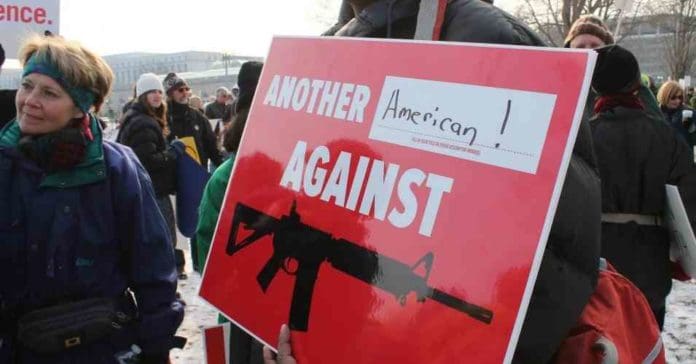
Congress has repeatedly refused to take action on measures to curb gun violence. (Photo: Elvert Barnes/flickr/cc)
On the floor of the U.S. House on Monday, a handful of Democrats shouted, “Where’s the bill?” as House Speaker Paul Ryan (R-Wisconsin) introduced a moment of silence for the victims of the Orlando shooting.
South Carolina Rep. Jim Clyburn, the number 3 Democrat in the House, attempted to ask Ryan when the chamber would debate gun control legislation, but Ryan interrupted the question with a gavel and directed lawmakers to proceed with an unrelated vote.
“I think people are frustrated that all we do in response to these terrible atrocities is take 10 seconds to have a moment of silence,” said Rep. Jim McGovern (D-Mass.).
Earlier in the day, the party’s presumptive presidential nominee Hillary Clinton reiterated a call for an assault weapons ban, calling them a “weapon of war.”
“I believe strongly that commonsense gun safety reform across our country would make a difference,” Clinton said.
However, Democrats’ frustration with the lack of action on gun control belies a history of passiveness on that very issue. After the 1994 Federal Assault Weapons Ban signed into law by President Bill Clinton expired 10 years later, Democrats made largely no effort to renew it. President Barack Obama in 2008 outlined a proposal to make the legislation permanent, and another concerted push to ban assault weapons arose after the Sandy Hook shooting in December 2012, but Congress repeatedly refused to take action on any of those or other measures.
The Washington Post writes, “The first decade after the ban expired suggested that its political potency had run out. In 2013, Sen. Dianne Feinstein (D-Calif.) offered a modified assault weapons ban as part of the doomed post-Newtown gun safety package. It won just 40 votes, losing 15 Democrats, mostly from Western states and red states.”
And despite other measures like the Brady Handgun Violence Prevention Act, also signed in 1994, gun sales have continued to climb and gun violence remains widespread, with a 2016 National Institutes of Health study finding that the U.S., home to five percent of the world’s population, has 31 percent of all public mass shootings. And as CNBC reported on Monday, shares in gun manufacturers Smith & Wesson and Sturm Ruger jumped 6.9 percent and 8.5 percent, respectively, following the Orlando shooting.
Sunday’s rampage preceded, by just a few days, the gruesome one-year anniversary of a white supremacist attack on Emanuel A.M.E. Church in Charleston, South Carolina—Clyburn’s home state.
CNN reports:
Clyburn wants the House to act on three gun control measures: One dealing with what he called the “Charleston loophole” that allowed gunman Dylann Roof to buy weapons since a background check that he would have failed was not completed in three days; the second would prevent people on the FBI’s terrorist watch list from buying guns; the third would block anyone convicted of a hate crime from buying a gun.
Unlike some of his colleagues, Clyburn is particularly outspoken about the issue. As the Charleston Post and Courier explains, while Democrats face heightened resistance from a Republican-controlled Congress, there are other tools at their disposal to push legislation on gun control:
In the House, Democrats can force procedural votes to delay the flow of debate on any bill being considered on the floor, In the Senate, Democrats can stop movement on a bill entirely as long as Republicans deny a vote on their legislation. In order to resume business as usual, Republicans might have to allow Democrats to have their votes — and hope the Democrats don’t win.
Dan Gross, president of the Brady Campaign to Prevent Gun Violence, said in a statement on Monday that “the bottom line is that in this country, it is far too easy for those who hate and are intent on doing harm…to access guns. We owe it to the people of Orlando—and to all of the 90 Americans killed each day by guns—to do everything in our power to prevent this kind of violence.”
The Rev. Dr. Betty Deas Clark—a pastor at Emanuel A.M.E.—who came to Orlando just a day after the shooting as a guest of the Brady Campaign, said on a press call Monday that “It is very important for us to join together and to push the envelope in every way possible to make sure that we do better as a society.”
“I think enough, really, is enough,” she said, “and I just need us—’us’ meaning humanity—to step back and look at the world we are creating and to look and to see, is this the world we want to give our children, our grandchildren. If we do not change we are about to give a legacy to our children that is powerless and divisive and that breeds hate.”
On Tuesday, White House press secretary Josh Earnest referred to Obama’s previous support of a ban on assault weapons, but evaded accountability for action by stating, “The responsibility right now lies with Congress.”
